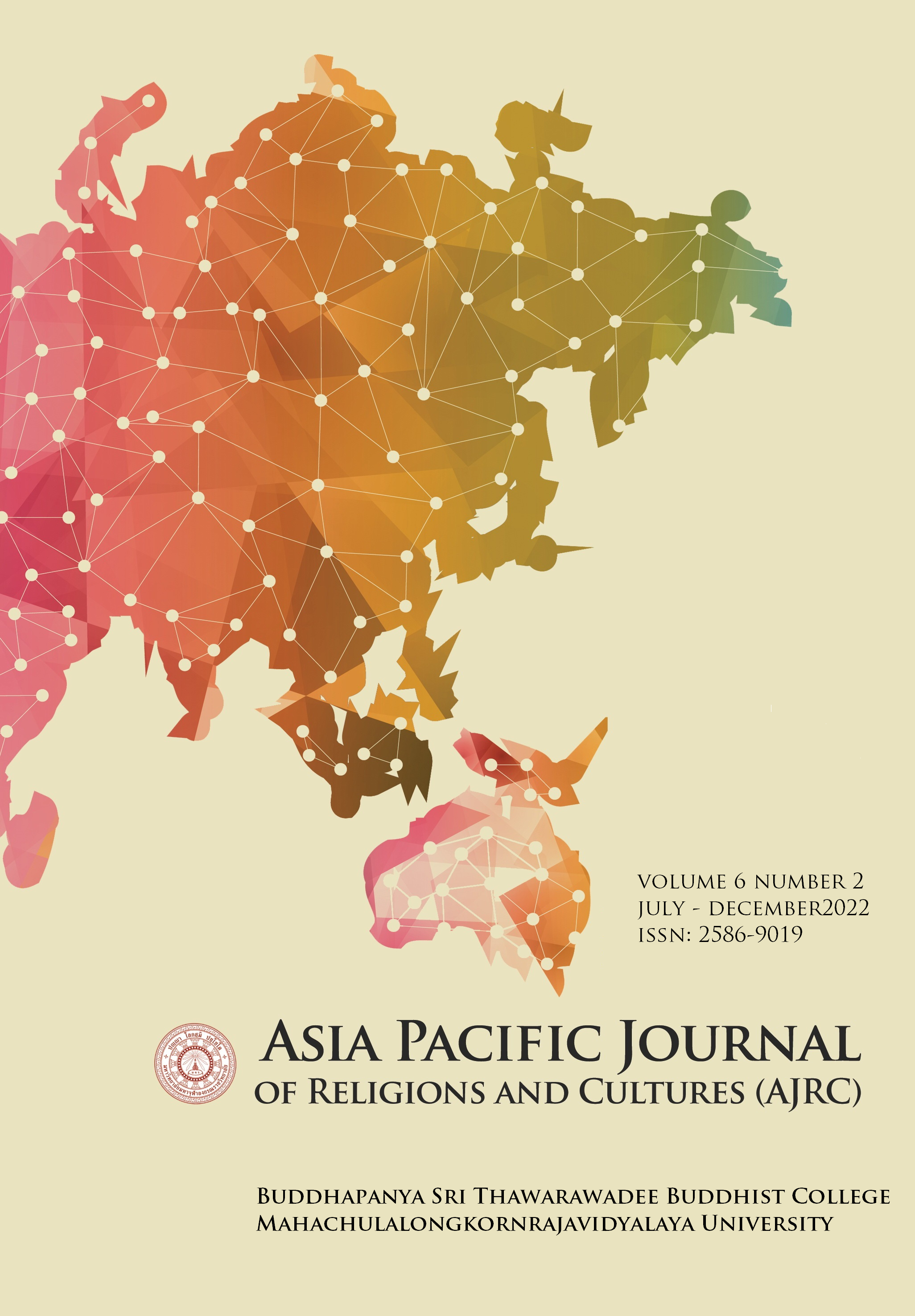IMPLEMENTING THE TRANSCENDENTAL MEDITATION TECHNIQUE IN A SCHOOL SETTING HELPS SECONDARY SCHOOL STUDENTS IMPROVE MENTAL HEALTH AND WELL-BEING
Main Article Content
Abstract
Mental health in adolescents is currently a worldwide concern. In fact, it has become a crisis that requires urgent attention. The literature clearly explains that one of the main causes of mental health issues in adolescents is stress from educational demands. In Thailand, adolescent mental health problems have been accelerating since 2011 where educational pressure is now the leading cause of suicide. This crisis has been further acerbated by the ongoing pandemic.
Numerous published studies report on the effectiveness of the regular practice of the Transcendental Meditation (TM) technique in reducing stress. Because the TM technique is easy to learn and implement in a school setting, a growing number of studies now show that the TM technique can be very effective in improving mental health and well-being in adolescents.
This pre-post study was designed to observe the effectiveness of the TM technique in improving mental health in students attending an all-girls boarding school in Thailand between the ages of 12 - 16 years. Students’ self-reported questionnaires were used for the study.
The results showed that the TM technique generated significant improvements in emotional symptoms, anxiety, hyperactivity and quality of sleep. Based on these results together with the other published research of this technique, this study suggests that the TM technique can address the current crisis—it can be easily implemented in any school setting to promote good mental health and well-being in students, especially during the continuing effects of the recent pandemic.
Article Details

This work is licensed under a Creative Commons Attribution-NonCommercial-NoDerivatives 4.0 International License.
References
Bangkok Post. (2021, October 10). 84 Covid deaths, 10,817 new cases. Retrieved May 5, 2022, from https://www.bangkokpost.com/thailand/general/2195451/84-covid-deaths-10-817-new-cases
Brooks, J. S., & Scarano, T. (1985). Transcendental Meditation in the Treatment of Post-Vietnam Adjustment. Journal of Counseling & Development, 64(3), 212–215. https://doi.org/10.1002/j.1556-6676.1985.tb01078.x
Brown, P. L. (2007, June 16). In the Classroom, a New Focus on Quieting the Mind. The New York Times. https://www.nytimes.com/2007/06/16/us/16mindful.html
Calderon, R., Pupanead, S., Prachakul, W., & Kim, G. (2019). Happiness, perceived stress, psychological well-being, and health behaviors of Thai university students: preliminary results from a multinational study on well-being. Journal of American College Health, 69(2), 176–184. https://doi.org/10.1080/07448481.2019.1657871
Center for Wellness & Achievement in Education. (2015, April 21). Quiet Time Program Report. Retrieved May 25, 2022, from https://cdn.theatlantic.com/assets/media/files/quiet-time-white-paper.pdf
Collected Papers. (2021). Scientific Research on Transcendental Meditation and TM-Sidhi Program. Retrieved July 28, 2022, from https://researchtm.net/collected-papers/
David Lynch Foundation. (n.d.). The Quiet Time Program. Retrieved June 1, 2022, from https://www.davidlynchfoundation.org/pdf/Quiet-Time-Brochure.pdf
Goodman, R., Ford, T., Simmons, H., Gatward, R., & Meltzer, H. (2003). Using the Strengths and Difficulties Questionnaire (SDQ) to screen for child psychiatric disorders in a community sample. International Review of Psychiatry, 15(1–2), 166–172. https://doi.org/10.1080/0954026021000046128
Jevning, R. (1978). Adrenocortical activity during meditation. Hormones and Behavior, 10(1), 54–60. https://doi.org/10.1016/0018-506x(78)90024-7
Maharishi Foundation USA. (n.d.). What's the evidence? Retrieved August 22, 2022, from https://www.tm.org/research-on-meditation
McEwen, B. S. (2006). Protective and damaging effects of stress mediators: central role of the brain. Dialogues in Clinical Neuroscience, 8(4), 367–381. https://doi.org/10.31887/dcns.2006.8.4/bmcewen
Nagendra, R. P., Maruthai, N., & Kutty, B. M. (2012). Meditation and Its Regulatory Role on Sleep. Frontiers in Neurology, 3. https://doi.org/10.3389/fneur.2012.00054
Nidich, S. I., Rainforth, M. V., Haaga, D. A. F., Hagelin, J., Salerno, J. W., Travis, F., Tanner, M., Gaylord-King, C., Grosswald, S., & Schneider, R. H. (2009). A Randomized Controlled Trial on Effects of the Transcendental Meditation Program on Blood Pressure, Psychological Distress, and Coping in Young Adults. American Journal of Hypertension, 22(12), 1326–1331. https://doi.org/10.1038/ajh.2009.184
Nidich, S., Nidich, R., Rainforth, M., Grant, J., Valosek, L., Chang, W., & Zigler, R. (2011). Academic Achievement and Transcendental Meditation: A Study with At-Risk Urban Middle School Students. Education, v131 (Spr 2011), 556–564. https://eric.ed.gov/?id=EJ996375
Northwestern University. (n.d.). PROMIS. Retrieved July 4, 2022, from https://www.healthmeasures.net/explore-measurement-systems/promis
Orme-Johnson, D. W., & Barnes, V. A. (2014). Effects of the Transcendental Meditation Technique on Trait Anxiety: A Meta-Analysis of Randomized Controlled Trials. The Journal of Alternative and Complementary Medicine, 20(5), 330–341. https://doi.org/10.1089/acm.2013.0204
Pascoe, M. C., Hetrick, S. E., & Parker, A. G. (2019). The impact of stress on students in secondary school and higher education. International Journal of Adolescence and Youth, 25(1), 104–112. https://doi.org/10.1080/02673843.2019.1596823
Roth, R. (1994). Transcendental Meditation: Revised and Updated Edition (Revised, Updated ed.). Primus.
Thai Health Project. (2020). 12 Indicators of Health of Thai Adolescents and Youth in Thai Health 2020 (p. 10–32). Institute for Population and Social Research, Mahidol University. Retrieved May 30, 2022, from https://www.thaihealth.or.th/data/ecatalog/763/pdf/763.pdf
Travis, F., Haaga, D. A., Hagelin, J., Tanner, M., Nidich, S., Gaylord-King, C., Grosswald, S., Rainforth, M., & Schneider, R. H. (2009). Effects of Transcendental Meditation practice on brain functioning and stress reactivity in college students. International Journal of Psychophysiology, 71(2), 170–176. https://doi.org/10.1016/j.ijpsycho.2008.09.007
Travis, F., & Pearson, C. (2000). Pure Consciousness: Distinct Phenomenological and Physiological Correlates of “Consciousness Itself.” International Journal of Neuroscience, 100(1–4), 77–89. https://doi.org/10.3109/00207450008999678
UNICEF. (n.d.). A Situation Analysis of Adolescents in Thailand 2015–2016. Retrieved May 30, 2022, from https://www.unicef.org/thailand/sites/unicef.org.thailand/files/2018-08/adolescent-situation-analysis-thailand-en.pdf
UNICEF. (2021, October 8). COVID-19 pandemic continues to drive poor mental health among children and young people. UNICEF Thailand. Retrieved July 27, 2022, from https://www.unicef.org/thailand/press-releases/covid-19-pandemic-continues-drive-poor-mental-health-among-children-and-young-people
United Nations. (2020, September 17). COVID-19 impact on young people’s mental health in spotlight. United Nations Western Europe. Retrieved June 2, 2022, from https://unric.org/en/covid-19-impact-on-young-peoples-mental-health-in-spotlight/
Vance, A., Silk, T. J., Casey, M., Rinehart, N. J., Bradshaw, J. L., Bellgrove, M. A., & Cunnington, R. (2007). Right parietal dysfunction in children with attention deficit hyperactivity disorder, combined type: a functional MRI study. Molecular Psychiatry, 12(9), 826–832. https://doi.org/10.1038/sj.mp.4001999
Wallace, R., Benson, H., & Wilson, A. (1971). A wakeful hypometabolic physiologic state. American Journal of Physiology-Legacy Content, 221(3), 795–799. https://doi.org/10.1152/ajplegacy.1971.221.3.795
World Health Organization. (2021, November 17). Adolescent mental health. Retrieved July 20, 2022, from https://www.who.int/news-room/fact-sheets/detail/adolescent-mental-health
World Health Organization. (n.d.). Thailand: WHO Coronavirus Disease (COVID-19) Dashboard With Vaccination Data. Retrieved July 27, 2022, from https://covid19.who.int/region/searo/country/th


